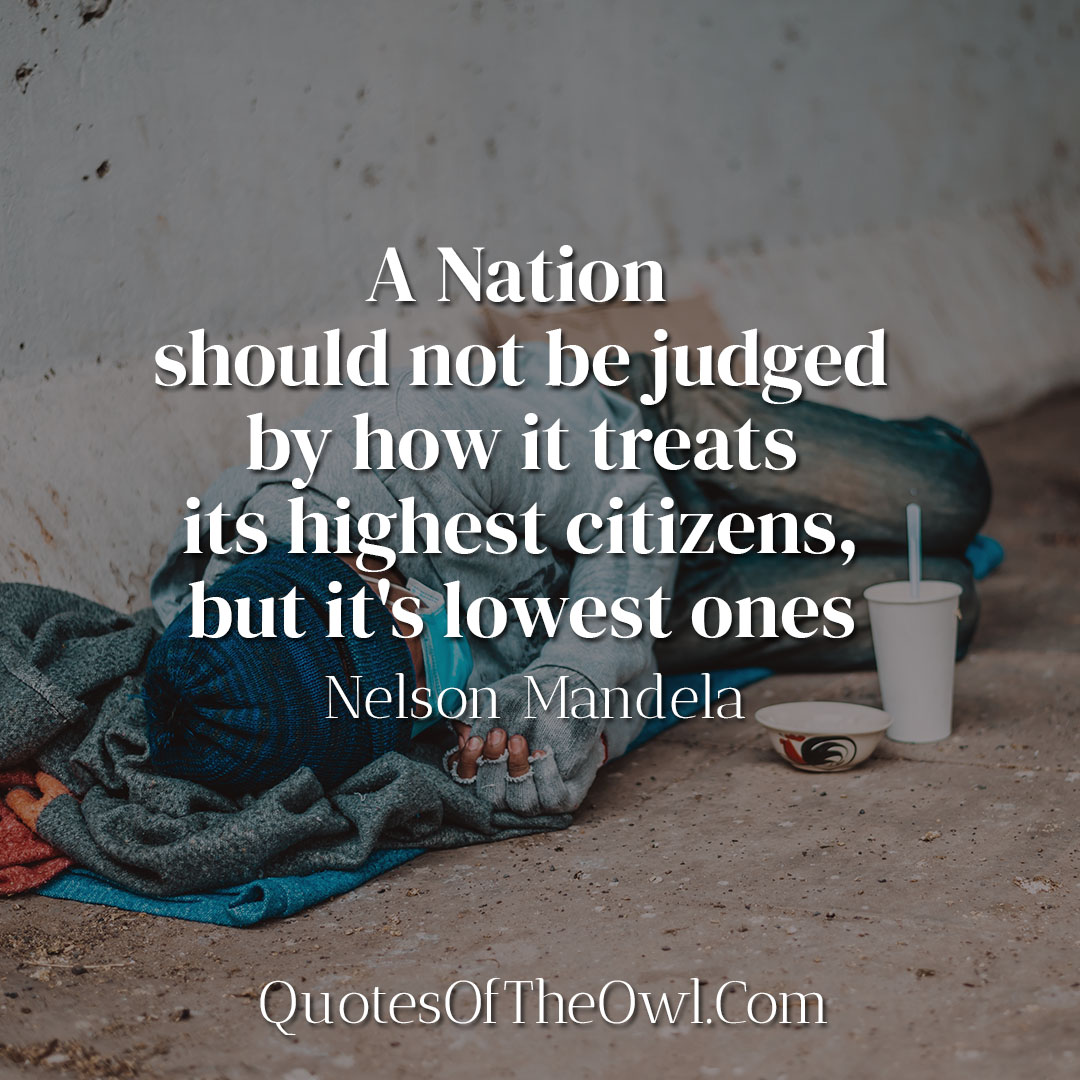What is the meaning of Nelson Mandela’s Quote “A Nation should not be judged by how it treats its highest citizens, but it’s lowest ones”
Nelson Mandela, an iconic South African leader and anti-apartheid activist, once stated, “A nation should not be judged by how it treats its highest citizens, but its lowest ones.” This thought-provoking quote encapsulates the essence of equality, social justice, and compassion. In this article, we delve into the meaning behind this quote, explore its context, and discuss its significance in today’s society.
Who was Nelson Mandela?
Before delving into the quote’s meaning, it is essential to understand who Nelson Mandela was. Nelson Mandela was a renowned political leader who fought against the apartheid regime in South Africa. He dedicated his life to advocating for human rights, equality, and racial reconciliation. Mandela became the first black President of South Africa in 1994, serving as a symbol of hope and unity in a nation previously divided by racial oppression.
Book Recommendation: Nelson Mandela’s Favorite African Folktales
Context of the Quote
During his long years of imprisonment, Nelson Mandela witnessed the stark disparities and inequalities that existed within South African society. The apartheid system systematically oppressed the majority Black population, treating them as second-class citizens. Mandela’s quote reflects his deep understanding of the social issues plaguing his country and his commitment to rectifying them.
Understanding the Quote
When Nelson Mandela stated that “a nation should not be judged by how it treats its highest citizens, but its lowest ones,” he emphasized the importance of assessing a society based on its treatment of the most marginalized and vulnerable members. Instead of focusing solely on the privileged few, a nation’s character and moral standing are better judged by how it uplifts and protects its most disadvantaged individuals.
Importance of Treating All Citizens Equally
Mandela’s quote underscores the fundamental principle of equality. Every individual, regardless of their social status, race, or economic background, deserves dignity, respect, and fair treatment. By highlighting the significance of how a nation treats its lowest citizens, Mandela reminds us that a just society upholds the rights and well-being of all its members, leaving no one behind.
A Nation’s Measure of Success
The quote challenges the conventional notion of measuring a nation’s success solely based on economic prosperity or the achievements of its elite members. Instead, it redirects attention to the welfare and inclusivity of the entire population. True success lies in a society’s ability to uplift the disadvantaged, provide equal opportunities, and bridge the gaps that divide communities.
Impact of the Quote
Nelson Mandela’s words resonate far beyond the boundaries of South Africa. They serve as a reminder to governments, policymakers, and citizens worldwide that social progress and justice are the cornerstones of a thriving nation. The quote has inspired countless individuals and movements to fight for equality and justice, seeking to dismantle systemic barriers and create a more inclusive society.
Examples of Nelson Mandela’s Legacy
Nelson Mandela’s personal life and actions exemplified his belief in the quote’s principles. Throughout his leadership, he championed reconciliation and forgiveness, initiating a process of healing in South Africa. Mandela’s commitment to equality influenced policies that aimed to address historical injustices and promote social cohesion. His work, along with many others, laid the foundation for a more equitable South Africa.
Lessons for Society
Mandela’s quote holds valuable lessons for society as a whole. It reminds us of our collective responsibility to challenge social inequality, promote inclusivity, and protect the rights of the marginalized. It encourages us to question and rectify systems that perpetuate discrimination, ensuring that no individual is left behind. By embracing Mandela’s ideals, we can strive for a fairer and more compassionate world.
Conclusion
In conclusion, Nelson Mandela’s quote, “A nation should not be judged by how it treats its highest citizens, but its lowest ones,” serves as a powerful reminder of the importance of equality and social justice. It prompts us to reevaluate our standards of measuring a nation’s success and encourages us to prioritize the well-being of the most vulnerable members of society. Mandela’s words continue to inspire and guide us toward building a more equitable and inclusive world for all.

